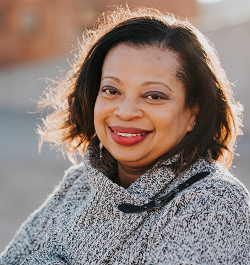Tonita Webb’s move to president and CEO of Verity Credit Union ($831.3M, Seattle, WA) in April 2021 was a first for her and for the member-owned financial cooperative.

It was the Air Force veteran and mother of four’s first foray into the top spot after more than 20 years of HR and management experience, including the past 15 in progressively responsible roles at Seattle Credit Union ($1.1B, Seattle, WA).
Webb — who was raised by a single mother in low-income housing projects in the Virginia Tidewater — is the first woman and person of color to hold the top spot at Verity, which was founded in 1933 as Postal Works Credit Union #8.
Here, Webb shares insight she’s gleaned after her first 19 months at the helm.
“It can easily take a year before you understand your organization and figure out what direction you need to go in leading it.”
You succeeded John Zmolek, who was with Verity for 31 years and retired after nearly eight years as CEO. How did you establish credibility and authority with your new staff?
Tonita Webb: I’ve learned not to fall into trying to be plug-and-play. I’ve never spent a lot of time thinking about my predecessors, about who they were and how they showed up at the job. People are eager to know and understand you and how your leadership will enable them to perform their jobs.
I came being me — talking about what I hope to see in the future, working to get people aligned, and starting the journey of getting to know one another.
A lot of things were different about me that our credit union had not experienced from a CEO. First woman. First BIPOC person. I had to figure out my stride coming in. I’ve learned to show up as my authentic self.
How about your senior managers? How did you cultivate those important relationships?
TW: We talked a lot about the hierarchy. I understand where I sit, but the truth of the matter is, I can’t accomplish my job without them. What they bring to the table is important whether I perform well or not. Those conversations were some of the first I had here.
I’m happy to say we haven’t had a lot of turnover in the 19 months I’ve been here. In fact, we’ve added two to the team, a chief risk officer and a chief impact strategy officer, whose role is to measure the impact of our strategies to serve the financially underserved.
How have you developed and supported a relationship with your board of directors?
TW: Since I started in the middle of the pandemic, there was not a lot of face-to-face time. That said, I drew from past experience on how to build trust and alignment.
CU QUICK FACTS
Verity Credit Union
DATA AS OF 06.30.22
HQ: Seattle, WA
ASSETS: $831.3M
MEMBERS: 40,826
BRANCHES: 8
EMPLOYEES:156
NET WORTH RATIO: 8.8%
ROA: 1.00%
One thing I appreciate about our board is that they decided to invest in me. We’ve been working with consultants as we build governance, structure, and relationships that are proving vital to building healthy relationships with our board and to building a healthy credit union.
One of the first things our consultants pointed out was the lack of a common language. Things we were saying had different meanings among us. For instance, the concept of social justice was primarily environmental to some of us. To others, it was diversity, equity, and inclusion.
We now have a better understanding of the intersection of all these important things as well as a mutual trust and a relationship built around what we agree we want to be and accomplish as a credit union. We’re better able, too, to disagree and move forward as we navigate our new path.
How is being a CEO different from other senior leadership roles? What have you learned about that?
TW: There’s no one else in the organization with your position, and that can be a lonely road. I don’t take lightly that there are 100-and-something employees who count on their Verity paycheck, and a lot of decisions I’m responsible for determine whether they continue to keep that paycheck.
The same goes for our members who depend on our products and services. That’s a shared responsibility for all of us, of course, but I’m ultimately responsible for the decisions we make about what we’re able to do.

How do you think your previous roles at Seattle Credit Union and other organizations, including the African-American Credit Union Coalition, shaped your current experience?
TW: The AACUC gave me the opportunity to be around some amazing folks who pushed me and helped me understand who I can be and how I can contribute to the industry. They’ve been great examples for me and are still cheerleaders of mine today. They set the stage for how I want to show up as a leader for others.
I had many roles in my 15 years at Seattle Credit Union. That was my learning ground for the credit union industry and where I learned about the needs we can meet in our market. It’s also where I got to make mistakes, hone my craft, and learn how to show up as a better leader.
What has been your biggest mistake as a senior manager? And what did you learn from it?
TW: I think my biggest mistakes have been when I wasn’t able to show up as myself, to admit my faults, to be vulnerable in front of my staff. Early in my career, I presented this picture as a leader that had to be perfect, but now I know the roadblocks and pain in being a leader can be tremendous.
We need to be able to show we’re not perfect and we are vulnerable. Doing that helps create psychological safety for you and your staff, and it gives them the opportunity to be vulnerable themselves. Another benefit is that you get innovation you wouldn’t otherwise get if people are afraid of making mistakes.
What have you learned about yourself or your leadership style?
TW: Since I’ve taken this position, I’ve gotten more comfortable with my own humanity. I’m impacted by things I don’t always have the right answers for, and I’m fully capable of making mistakes. This role humbles you.
Even though I was the oldest child, brought up with rivalries, and served as a police officer and an MP in the military, I’m really a softie at heart. My passion for people was bigger than I ever thought. If I could solve the world’s problems, I would. I want everyone to have every opportunity to be successful. I know that’s not always realistic, but I will try.
“If I could solve the world’s problems, I would. I want everyone to have every opportunity to be successful. I know that’s not always realistic, but I will try.”
What resources have you found most beneficial in helping acclimate to being a CEO?
TW: My board provided executive coaching. That’s something I’m passionate about and that we agreed to before I came on board. I realized I would need help navigating this new role.
And, because this job can be a heavy burden and because everyone is depending on you, I see a therapist to make sure my mental health stays intact and that the stresses and burdens don’t overtake my thought process.
What tips do you have for a new CEO?
TW: There are many books on that topic, and while I agree with a lot of what they say, my experience and that of other CEOs I’ve talked to is that it’s better to spend less time on coming up with a plan and more time on listening to everyone in the organization.
Figure out how things have been done and why. It can easily take a year before you understand your organization and figure out what direction you need to go in leading it.
How To Lead With Purpose
LEARN MORE & REGISTER TODAY

This interview has been edited and condensed.
